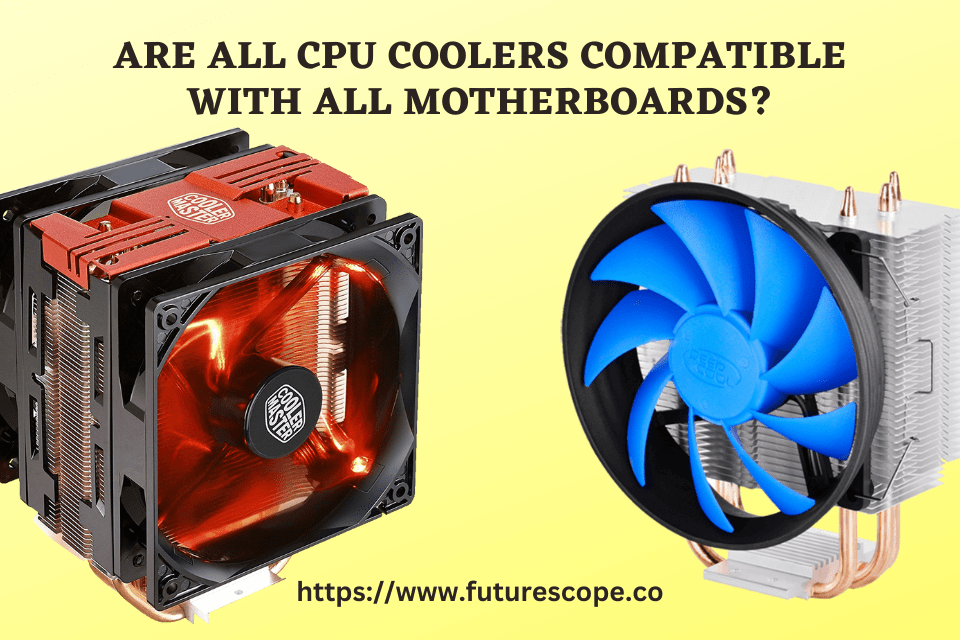What We Have Covered in This Article
Last Updated on November 26, 2022 by Editor Futurescope
There are a few factors to consider when determining whether a CPU cooler is compatible with a particular motherboard. The first is the socket type. Intel and AMD CPUs use different sockets, so it’s important to make sure that the cooler you choose is compatible with the socket on your motherboard.
The second factor to consider is the TDP (thermal design power) of the CPU. This is the amount of heat that the CPU generates, and it’s important to choose a cooler that can handle this amount of heat. Finally, you’ll need to make sure that there are no clearance issues between the CPU cooler and any other components on the motherboard.
Are All Cpu Coolers Compatible With All Motherboards? No, not all CPU coolers are compatible with all motherboards. In fact, there are a few different factors that you need to consider when choosing a CPU cooler for your motherboard.
First, you need to make sure that the cooler will fit onto your motherboard. Second, you need to check that the cooler is compatible with your CPU socket. Finally, you need to make sure that the fan on the cooler will be able to reach all of the heat pipes on your CPU.
AM4 Coolers on AM5 – The Final Answer
How Do I Know What CPU Cooler is Compatible With My Motherboard?
There are a few things you need to take into account when choosing a CPU cooler for your motherboard. The first is the socket type. Every motherboard has a specific CPU socket type that is compatible with only certain types of processors.
For example, an LGA 1151 motherboard can only use processors with an LGA 1151 socket. If you’re not sure what socket type your motherboard has, you can look it up in the manual or online. The second thing to consider is the TDP (thermal design power) of the processor.
This is basically how much heat the processor produces and therefore how much cooling it will need. You can find this information in the processor’s specifications. Most CPU coolers will have a TDP rating that tells you how much heat they can dissipate.
Make sure to choose a cooler that has a higher TDP rating than your processor. Finally, you need to make sure that the cooler you choose is compatible with your case. Some coolers are very large and may not fit in smaller cases.
It’s also important to make sure that there’s enough clearance around the cooler so that it doesn’t interfere with any other components in your case such as RAM modules or graphics cards.
Can You Put Any CPU Cooler on a Motherboard?
There are a few things to consider when selecting a CPU cooler for your motherboard. The first is the form factor, or size, of the cooler. The second is the socket type, which must match the socket type of your CPU.
And the third is compatibility with your motherboard’s chipset. The most important factor in choosing a CPU cooler is ensuring that it will fit inside your case. Many coolers are designed to fit specific case sizes, so be sure to measure both your case and the cooler before making a purchase.
If you’re not sure which size to get, err on the side of caution and choose a larger size. It’s always easier to modify your case to accommodate a larger cooler than it is to try and make a smaller one fit. Once you’ve determined what size you need, take a look at the different types of cooling solutions available.
Air coolers are typically cheaper and easier to install than liquid coolers, but they’re also less effective at cooling down your system. If you live in an area with hot weather or if you plan on overclocking your CPU, then liquid cooling may be worth the investment. But for most people air cooling will suffice.
When selecting an air cooler, pay attention to the CFM (cubic feet per minute) rating as well as the dBA (decibels). A higher CFM rating means that more air will be moved by the fan, resulting in better cooling performance. However, this also means that the fan will produce more noise.
So if you’re looking for a quiet solution, choose a cooler with a lower CFM rating but higher dBA number instead. As for liquid coolers, there are two main types: all-in-one (AIO) units and custom loops . AIO units come pre-assembled with everything you need for installation while custom loops require some assembly but offer greater flexibility in terms of expandability and aesthetics .
Custom loops also tend to provide better cooling performance than AIOs , but they’re also more expensive . Choose whichever option best fits your needs and budget . Installing either type of CPU cooler is relatively easy , although custom loops can be more challenging due extra tubing running through your case . Whichever route you go , just be sure follow instructions carefully so don’t damage any delicate components in process.
Do All CPU Coolers Work on All Motherboards?
No, not all CPU coolers work on all motherboards. In order for a CPU cooler to be compatible with a given motherboard, it must support the same socket type as the motherboard. For example, if you have an Intel LGA 1151 socket motherboard, you will need an Intel LGA 1151 socket CPU cooler.
Similarly, if you have an AMD AM4 socket motherboard, you will need an AMD AM4 socket CPU cooler. There are some universal CPU coolers out there that come with adapters to support multiple socket types, but they are generally more expensive and not as effective as a dedicated cooler for a specific socket type.
Do All CPUs Fit All Motherboards?
No, not all CPUs fit all motherboards. You must ensure that you purchase a CPU that is compatible with your motherboard. In order to do this, you must first identify the socket type of your motherboard.
The socket type will dictate which CPUs are compatible with your motherboard. For example, an LGA 1151 socket is only compatible with certain Intel CPUs. So if you have an LGA 1151 socket on your motherboard, then you would need to purchase an Intel CPU that is also LGA 1151-compatible.
CPU Cooler Compatibility Check
In order to ensure that your CPU cooler is compatible with your motherboard, you’ll need to check a few things. First, identify the socket type of your CPU. This will be listed in the technical specifications for your processor, and will usually be something like LGA 1151 or AM4.
Once you know the socket type, compare it to the list of supported sockets on the product page for your chosen cooler. Next, take a look at the TDP (thermal design power) rating for your CPU. This is another specification that will be listed in the tech specs for your processor, and it indicates how much heat the CPU generates.
Make sure that your chosen cooler can handle this amount of heat – most coolers will have no problem, but it’s something to double-check. Finally, take a look at compatibility with any other components in your system. Some coolers come with special features like RGB lighting or fan control software that may not be compatible with all motherboards or other components.
If you’re unsure about compatibility, reach out to customer support for help before making your purchase.
Motherboard CPU Cooler Compatibility
If you’re looking to upgrade your CPU cooler, it’s important to make sure that it will be compatible with your motherboard. In this blog post, we’ll go over some things to keep in mind when choosing a new CPU cooler, as well as some tips on how to ensure compatibility. When it comes to CPU coolers, there are two main types: air coolers and liquid coolers.
Air coolers work by using fans to circulate air around the CPU, while liquid coolers use water or another liquid to dissipate heat. Both types of coolers have their own advantages and disadvantages, so it’s important to choose the one that best suits your needs. As far as compatibility goes, most air and liquid coolers will work with any motherboard.
However, there are some exceptions. For example, some high-end air coolers may not fit certain smaller form factor motherboards. Additionally, if you’re using a non-standard socket (like AMD’s TR4 socket), you’ll need to make sure that your chosen cooler is compatible with that socket.
Once you’ve selected the right cooler for your needs, the next step is ensuring that it will fit properly on your motherboard. The first thing you’ll need to do is check the dimensions of both the cooler and your motherboard; most manufacturers list these dimensions on their websites or in their product manuals. If everything looks good so far, the next step is attaching the mounting bracket (if applicable).
Some final tips: – Make sure that all fan headers on your motherboard are occupied before installing a new CPU cooler (this includes both case fans and radiator fans). – If possible, try to route cables and tubing away from areas where they could potentially come into contact with moving parts (like fans).
When installing a liquid cooling system, take extra care not avoid leaks!
CPU Cooler Not Compatible With Motherboard
You’ve probably heard of CPU coolers before, but did you know that they come in different shapes and sizes? Some CPU coolers are compatible with specific motherboards, while others aren’t. This can be a frustrating issue if you’re trying to build a new computer and can’t figure out why your CPU cooler isn’t working.
In this article, we’ll go over some of the most common reasons why a CPU cooler might not be compatible with your motherboard. The first thing to check is the socket type. Each motherboard has a specific socket type that it uses, and the CPU cooler must match that socket type in order to fit.
For example, an LGA 1151 motherboard will use a different socket than an LGA 2066 motherboard. If your CPU cooler doesn’t match the socket type, then it’s simply not going to fit no matter what you do. Another common issue is clearance.
Even if the socket types match up, there might not be enough space inside the case for the CPU cooler. This is especially true for larger coolers or cases with tight spaces. Always check the dimensions of both the cooler and the case before buying to make sure they’ll fit together properly.
If you’re still having trouble finding a compatible CPU cooler, there are always special adapters that can be used to bridge any gaps. These adapters usually come at an additional cost, so keep that in mind when budgeting for your build. With a little bit of research, you should be able to find a compatible CPU cooler for your needs without any problems!
Conclusion
The answer is no, not all CPU coolers are compatible with all motherboards. It’s important to check the compatibility of your cooler with your motherboard before purchasing. Different coolers use different mounting systems, and some coolers may not be compatible with certain types of motherboards.
Additionally, some coolers come with their own fans, while others do not. Make sure to check what type of fan your cooler requires and whether or not your motherboard has that type of fan connection.









